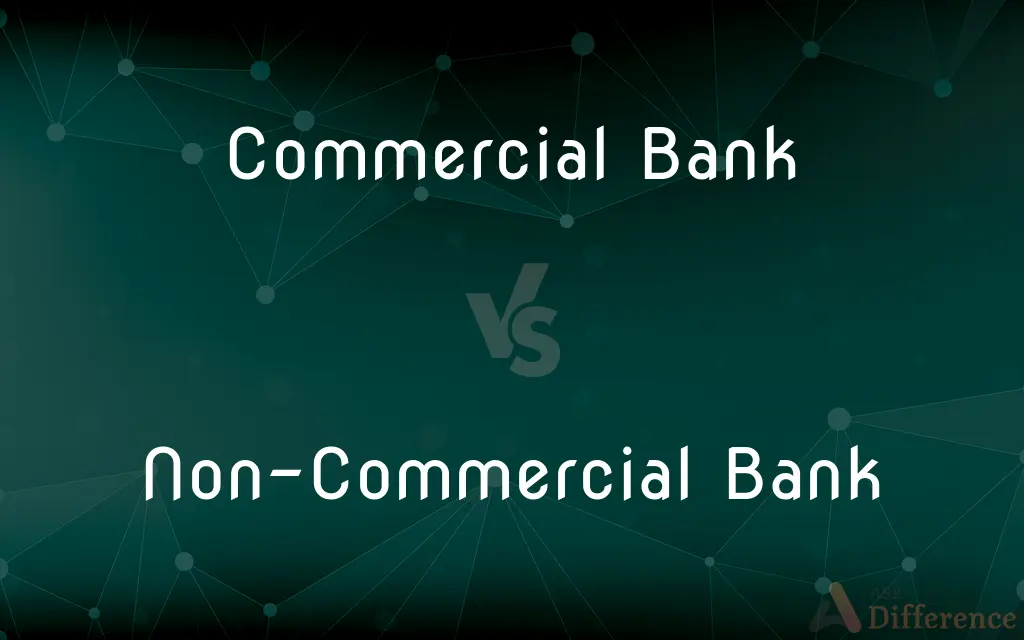Commercial Bank vs. Non-Commercial Bank — What's the Difference?
By Tayyaba Rehman — Published on October 15, 2023
Commercial Banks offer a wide range of services, focusing on businesses and profit; Non-Commercial Banks primarily serve individuals, emphasizing social welfare.

Difference Between Commercial Bank and Non-Commercial Bank
Table of Contents
ADVERTISEMENT
Key Differences
Commercial Banks and Non-Commercial Banks both operate within the financial sector but serve different purposes and clientele. Commercial Banks are profit-oriented financial institutions offering a wide range of services such as deposits, loans, and investment products primarily to businesses. They play a pivotal role in economic development by providing credit to businesses, fostering economic growth and creating employment opportunities.
In contrast, Non-Commercial Banks, also known as development banks or cooperative banks, focus on social welfare over profit. These banks predominantly serve individuals and aim to promote economic development in underserved areas or sectors. They often specialize in providing financial services and credit to specific sectors like agriculture or small-scale industries, where commercial banks might be reluctant to venture due to perceived risks.
While Commercial Banks are driven by profit motives and primarily serve businesses, Non-Commercial Banks are motivated by social welfare and primarily serve individuals and specific sectors. Commercial Banks facilitate various financial services, including wealth management and investment banking, focusing on maximizing shareholder value. On the other hand, Non-Commercial Banks emphasize financial inclusion, providing access to financial services to marginalized and low-income groups, thereby contributing to economic equality and social development.
To conclude, Commercial Banks and Non-Commercial Banks are distinct in their goals, clientele, and services. Commercial Banks focus on a broader clientele, offering varied services with the intent of making a profit, while Non-Commercial Banks emphasize social objectives, serving specific sectors and individuals who may not have easy access to financial services, thus aiding in the equitable development of the economy.
Comparison Chart
Primary Focus
Profit-oriented and serves businesses primarily.
Focused on social welfare and serves individuals primarily.
ADVERTISEMENT
Clients
Businesses and individuals.
Individuals, especially in underserved areas or sectors.
Services
Offers a wide range of services including loans, deposits, and investments.
Provides basic banking services, often with a focus on a specific sector.
Motivation
Maximizing shareholder value.
Promoting economic equality and social development.
Risk Approach
May avoid high-risk sectors.
Often serves high-risk sectors underserved by commercial banks.
Compare with Definitions
Commercial Bank
Commercial Banks offer wealth management and investment banking services.
We approached the Commercial Bank for wealth management advice.
Non-Commercial Bank
A Non-Commercial Bank is a financial institution focused on social welfare and economic equality.
The Non-Commercial Bank provided loans to farmers in underserved areas.
Commercial Bank
Commercial Banks aim to maximize shareholder value through their services.
The success of the Commercial Bank was reflected in the increased value for shareholders.
Non-Commercial Bank
Non-Commercial Banks aim to promote economic development in specific sectors.
The Non-Commercial Bank was established to support the development of the agricultural sector.
Commercial Bank
Commercial Banks primarily serve businesses, providing loans, accepting deposits, and offering investment products.
The Commercial Bank offered multiple investment options for businesses.
Non-Commercial Bank
Non-Commercial Banks emphasize financial inclusion and access to financial services.
The Non-Commercial Bank extended its services to low-income groups to promote financial inclusion.
Commercial Bank
Commercial Banks play a crucial role in economic development and growth.
By providing loans to businesses, the Commercial Bank stimulated local economic growth.
Non-Commercial Bank
Non-Commercial Banks often specialize in serving sectors underserved by Commercial Banks.
The Non-Commercial Bank focused on providing financial services to the education sector.
Commercial Bank
A Commercial Bank is a profit-oriented financial institution offering a variety of services.
I applied for a business loan at the Commercial Bank.
Non-Commercial Bank
Non-Commercial Banks primarily serve individuals, especially in high-risk or underserved sectors.
We opened a savings account with the Non-Commercial Bank that specializes in serving small-scale industries.
Common Curiosities
Are Commercial Banks profit-oriented?
Yes, Commercial Banks are profit-oriented institutions aiming to maximize shareholder value.
Who do Non-Commercial Banks primarily serve?
Non-Commercial Banks primarily serve individuals, focusing on social welfare and economic equality, especially in underserved sectors.
Do Non-Commercial Banks offer loans to businesses?
Non-Commercial Banks primarily focus on individuals and specific sectors, but they may offer loans to businesses in those sectors.
What is the main goal of a Commercial Bank?
The main goal of a Commercial Bank is to maximize shareholder value by offering a variety of financial services, primarily to businesses.
Can individuals avail services from Commercial Banks?
Yes, individuals can avail a variety of services from Commercial Banks including loans, deposits, and wealth management.
Is the focus of Non-Commercial Banks on social welfare?
Yes, Non-Commercial Banks prioritize social welfare and economic equality, aiming to serve individuals and sectors that are underserved.
How do Commercial Banks support economic growth?
Commercial Banks support economic growth by providing credit to businesses, facilitating investments, and offering a range of financial services.
Are Non-Commercial Banks involved in economic development?
Yes, Non-Commercial Banks play a crucial role in economic development by serving underserved sectors and promoting economic equality and social development.
Can I invest money in a Commercial Bank?
Yes, Commercial Banks offer a variety of investment products and services.
Can Commercial Banks refuse to serve high-risk sectors?
Commercial Banks might avoid high-risk sectors to mitigate potential losses and maintain profitability.
Do Non-Commercial Banks focus on specific sectors?
Yes, Non-Commercial Banks often specialize in serving specific sectors like agriculture or small-scale industries, which are typically underserved by Commercial Banks.
How do Non-Commercial Banks contribute to economic equality?
Non-Commercial Banks promote economic equality by providing financial services to underserved and marginalized groups, focusing on social welfare.
Do Non-Commercial Banks provide investment options?
Non-Commercial Banks primarily focus on basic banking services and sector-specific support, but some may offer limited investment options.
Are the services offered by Commercial Banks varied?
Yes, Commercial Banks offer a wide range of services including loans, deposits, wealth management, and investment banking.
Do Commercial Banks play a role in employment creation?
Yes, by providing credit and other financial services to businesses, Commercial Banks facilitate economic activities leading to employment creation.
Share Your Discovery

Previous Comparison
Plants vs. Herbs
Next Comparison
Marines vs. U.S. ArmyAuthor Spotlight
Written by
Tayyaba RehmanTayyaba Rehman is a distinguished writer, currently serving as a primary contributor to askdifference.com. As a researcher in semantics and etymology, Tayyaba's passion for the complexity of languages and their distinctions has found a perfect home on the platform. Tayyaba delves into the intricacies of language, distinguishing between commonly confused words and phrases, thereby providing clarity for readers worldwide.














































